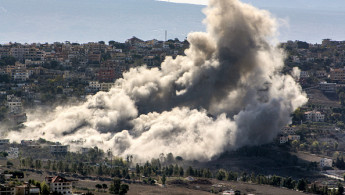Israel orders expulsion of densely-populated Tyre neighbourhoods amid massive strikes
Israeli air strikes hit Tyre on Wednesday morning, as Israel ordered a forced evacuation of heavily-populated neighbourhoods in the southern coastal city, causing fear and panic across Lebanon.
The strikes, reported by witnesses and local media, came around three hours after the Israeli army Arabic spokesperson Avichay Adaree issued widespread expulsion orders for central parts of the historic city, calling on citizens to leave and move north.
The areas include residential and commercial neighbourhoods around the streets of Al-Hiram, Jaafar Charafeddine, Abu Deib and Al-Athar Street. Adraee claimed that Hezbollah facilities are in the area without providing evidence.
Tyre civil defence urged residents to evacuate immediately via speakerphone and closed the entrances of the city to stop people coming in, the Lebanese state media National News Agency (NNA) reported.
Bilal Kashmar from Tyre's disaster management unit told AFP that the "entire city of Tyre" is being evacuated with around 14,500 people still present on Tuesday.
The neighbourhoods referenced by the Israeli army for evacuation are between two UNESCO World Heritage archaeological sites of the Roman-era Tyre Hippodrome dating back to the second century AD and the Egyptian port ruins.
Lebanon's culture minister has expressed concern for the fate of the country's historic sites amid Israel's bombardment and called for international protection.
The small city's old quarter which hugs the coast is home to Christian families, where there are six churches reflecting Lebanon’s multitude of Christian denominations. It is considered one of the oldest cities in the world and was first recognised as a key trading port on the Mediterranean coast by the Phoenicians.
The modern suburbs are home to Shia Muslims more affiliated to the political party Amal led by Parliament Speaker Nabih Berri, as well as Hezbollah, one of its allies.
The southern city known locally as Sur is just 20 kilometres from the Israeli border and holds historic significance in Lebanon for its religious and social diversity.
Lebanese activist Mohammed Fran told The New Arab's Arabic language sister outlet Al-Araby Al-Jadeed that the city has always been "closely tied to the Palestinian cause".
"It has witnessed several historic moments and stands as a testament to the unity of religious sects and national relationships."
Fran said that the targeting of Tyre fits into Israel's broader plan that has seen areas in the Bekaa valley, Nabatieh, and other southern villages heavily bombarded. Neighbourhoods, buildings, markets and landmarks have been destroyed or damaged.
Fran believes it is part of an Israeli strategy intended to weaken the population, cripple the economy, and create a rift between the people and Hezbollah or other resistance groups.
The activist said that today's aggression differs from the July 2006 war, both in Tyre and elsewhere. He noted the broader geographical spread and intensity of Israeli strikes, all occurring under Western, particularly US backing.
Thousands of Lebanese, including many families already displaced from southern villages who were sheltering in the city, are expected to flee north adding further pressure on services dealing with more than one million internally displaced people.
It follows a night of bombardment on the southern suburbs of Beirut after Israeli air forces struck sites in Dahiyeh, as well as in a string of southern villages including Khiam, as the army reportedly attempts to move further inland.
Israeli strikes have targeted villages surrounding Tyre since fighting began over one year ago, including the bombing of Jennata in June, which killed two women and wounded at least 20 other people.
Sixty-three people were killed in Israeli strikes on Monday with over 2,400 killed since October 2023, Lebanon's health ministry said.
United Nations Human Rights chief Volker Turk said he was "appalled" by the Israeli strike on the Beirut neighbourhood of Jnah on Monday night which killed at least 18 people, including four children, and wounded 60 others.
"The fundamental principles of international humanitarian law concerning the protection of civilians must be respected," he said, repeating calls for an immediate ceasefire.
Israel said late on Tuesday that Hezbollah commander Hashem Safieddine, who was presumed to have taken over the group's leadership after the death of Hassan Nasrallah, had been killed in a strike on Beirut three weeks ago. Saifeddine was the head of Hezbollah’s highest political body, the executive council.
The group said on Wednesday it had fired rockets at Israeli soldiers stationed between the border towns of Odaisseh and Rab El-Thalathine.
For its part, the Israeli army said on Wednesday its troops were conducting "limited, localised, targeted raids" against Hezbollah operatives and claimed to have killed some 70 fighters in the past day.
Its air defence system intercepted "two projectiles" fired from Lebanon that crossed into Israel with air raid sirens sounding in various towns north of Haifa.
Meanwhile, Washington-led negotiations for a ceasefire remain in the works after US special envoy Amos Hochstein's visit to Beirut on Monday where he had met with influential parliament speaker Nabih Berri.
Hochstein said the US was looking to end the war "as soon as possible" and that he was working with Lebanon and Israel to find a solution to end the conflict "once and for all".
Israel issued a stringent set of demands for a deal, including a plea for full access to Lebanese airspace as part of what it called an "active enforcement" of UN Security Council Resolution 1701.
US top diplomat Antony Blinken met with Israeli Prime Minister Benjamin Netanyahu and Defence Minister Yoav Gallant in a series of meetings in Israel on Tuesday.





 Follow the Middle East's top stories in English at The New Arab on Google News
Follow the Middle East's top stories in English at The New Arab on Google News
![The UAE is widely suspected of arming the RSF militia [Getty]](/sites/default/files/styles/image_330x185/public/2024-11/GettyImages-472529908.jpg?h=69f2b9d0&itok=Yauw3YTG)
![Netanyahu furiously denounced the ICC [Getty]](/sites/default/files/styles/image_330x185/public/2024-11/GettyImages-2169352575.jpg?h=199d8c1f&itok=-vRiruf5)
![Both Hamas and the Palestinian Authority welcomed the ICC arrest warrants [Getty]](/sites/default/files/styles/image_330x185/public/2024-11/GettyImages-2178351173.jpg?h=199d8c1f&itok=TV858iVg)